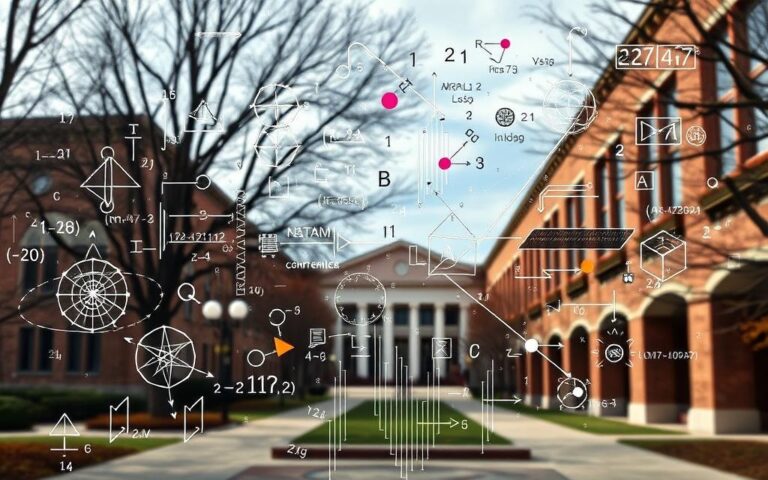Can You Pursue an MSc in Cybersecurity with a BSc in Computer Science?
Cyberattacks are happening more often, making the need for skilled cybersecurity experts critical. There’s been a 26.2% increase in the need for cybersecurity workers. So, getting a Master’s in this key area is a smart move for those with a BSc in Computer Science. It’s not only possible but also gives you a nice edge.
Universities know that a BSc in Computer Science covers the basics of computing and coding. This knowledge matches well with what you need to know for a cybersecurity master’s. So, if you’ve got a BSc in Computer Science, going for an MSc in Cybersecurity could open doors to an important and rewarding career.
The Relationship Between Computer Science and Cybersecurity
Computer science and cybersecurity are closely linked, supporting each other in many ways. By understanding what these fields are about, we can see how they work together. This shows the bond between computer science and cybersecurity.
Defining Computer Science
Computer Science covers a lot, from computing theories to creating software and understanding hardware. It sets the stage for many tech careers. Through this broad study, students gain skills that open doors to a range of sought-after jobs.
Understanding Cybersecurity
Cybersecurity is all about protecting systems from theft, damage, or hacking. It’s built on keeping data safe, intact, and available. With rising online threats, the demand for skilled cybersecurity experts is on the up, highlighting the field’s importance.
Shared Concepts and Skills
Computer science and cybersecurity share essential skills and ideas. These include:
- Programming skills in languages like Python, Java, or C++
- How networks are built and run
- Understanding of data setups and problem-solving methods
Those who study computer science are ready to face cybersecurity issues. They use their core knowledge to move smoothly into cybersecurity. Working together, both fields improve skills and chances of getting good jobs.
| Aspect | Computer Science | Cybersecurity |
|---|---|---|
| Focus | General computing technology | Information protection |
| Key Skills | Programming, algorithms, software development | Security measures, risk assessment, threat analysis |
| Career Opportunities | Over 100 diverse roles | Various specialisations within the cybersecurity domain |
| Salary Potential | Competitive within tech industry | Higher due to talent shortages |
Can I Do MSc Cyber Security After BSc Computer Science?
Getting a Master’s in Cybersecurity after a Bachelor’s in Computer Science is a great choice for aspiring professionals. Most universities know that students come with relevant skills and knowledge. They don’t usually require an undergraduate degree in cybersecurity, but knowing the prerequisites for MSc Cyber Security helps with preparation and application.
Prerequisites for Master’s in Cybersecurity
Although requirements can vary, many Master’s programs expect you to know the basics of cybersecurity. This makes it easier to adjust to a Master’s program’s demands. With a BSc in Computer Science, students already have the needed analytical and problem-solving skills.
Benefits of a BSc in Computer Science for MSc Candidates
A BSc in Computer Science is very beneficial for MSc studies. It lays a strong foundation in computing, which is crucial for studying cybersecurity deeper. Students know about programming, data structures, and network protocols. This knowledge makes them ideal candidates for various roles in cybersecurity. They are prepared to tackle different challenges in the field thanks to this background and awareness of new technologies.
Coursework and Projects Relevant to Cybersecurity
During their Bachelor’s, students cover topics like programming, network security, and algorithms. These subjects are key to understanding cybersecurity. They ensure students are ready for a Master’s course. Projects that simulate real-life situations give hands-on experience. This bridges the gap between theory and practice. Such experience is very important for succeeding in further studies. Schools like Franklin University provide courses with up-to-date tools and real examples, which helps apply what students learn.
Differences Between Cybersecurity and Computer Science Degrees
There are clear differences between degrees in cybersecurity and in computer science. These include focus areas, job market outlook, and career paths. Understanding these differences is key for people planning their studies and future jobs.
Focus Areas of Study
Cybersecurity degrees focus on security protocols, ethical hacking, and managing risks. In comparison, computer science degrees concentrate on creating algorithms, designing systems, and developing software. Each field starts with foundational knowledge but then moves in distinct directions.
Job Market Outlook for Graduates
The demand for cybersecurity experts is growing fast, expected to increase by 35% by 2031. This growth comes as organisations need to fight more cyber threats. In 2022, the FBI saw over 800,000 cybercrimes. Meanwhile, the job market for computer science is solid, with a 13% growth expected from 2020 to 2030. Knowing these trends helps graduates understand how their degree affects their career prospects.
Potential Careers with Each Degree
With a cybersecurity degree, graduates can become security analysts, penetration testers, or incident response managers. They learn to tackle modern security issues head-on. Those with a computer science degree often work as software developers, database admins, or IT project leaders. They use their skills in programming and system design. Each degree opens the door to different careers, matching the degree’s focus.

The Pathway to Transition from Computer Science to Cybersecurity
Moving from computer science to cybersecurity opens up many chances for those ready to learn more. Adding extra courses, getting hands-on experience, and networking can really help your career grow.
Recommended Additional Courses
Graduates in Computer Science should look into additional coursework on cybersecurity topics. Some good choices include:
- Cybersecurity Principles
- Ethical Hacking
- Digital Forensics
These elective classes add to your knowledge and give you the skills needed for cybersecurity jobs.
Internships and Hands-on Experience
Doing internships or part-time work in cybersecurity is a great way to learn by doing. This experience is key for understanding real security issues and makes you more employable.
Networking and Professional Development Opportunities
Making connections in the field is a strong strategy when moving to cybersecurity. You can meet people and find job opportunities by:
- Joining professional organisations, like the Association for Computing Machinery (ACM)
- Going to events and conferences in the industry
- Talking to professionals on sites like LinkedIn
Actions like these not only lead to possible jobs but also build your reputation in the field.
Conclusion
Going for an MSc in Cybersecurity after getting a BSc in Computer Science is a smart choice. It meets the high demand for cybersecurity experts in many fields. This path not only boosts careers but also lets graduates focus on specific areas of cyber defence.
There’s a big need for people skilled in fighting cybersecurity threats today. Getting into this area is both timely and beneficial. Roles like Cyber Security Analyst, Penetration Tester, and Ethical Hacker are out there. Graduates are encouraged to grab the chances an MSc Cybersecurity brings.
Learning by doing is essential for success. Places like SYSTECH Institute offer the hands-on training needed. Along with top certifications like CompTIA Security+ and CISSP, this training makes a strong cybersecurity career possible. It prepares you to keep the digital world safe.
FAQ
Can I pursue an MSc in Cybersecurity with a BSc in Computer Science?
Yes, you can. Universities often accept students with a Computer Science Bachelor’s for a Master’s in Cybersecurity. They share important knowledge and skills.
What are the prerequisites for a Master’s in Cybersecurity?
You don’t need a specific degree in Cybersecurity for most universities. A Computer Science BSc is enough. Some courses might ask for basic cybersecurity knowledge.
What benefits does a BSc in Computer Science offer for an MSc in Cybersecurity?
A Computer Science degree gives you key computing basics, programming, and critical thinking. These skills are vital for doing well in cybersecurity studies and challenges.
What coursework and projects should I have completed that are relevant to Cybersecurity?
You should have done courses in programming, network security, and algorithms. They give a good basis for cybersecurity work.
How do Cybersecurity and Computer Science degrees differ in focus?
Cybersecurity degrees focus more on protecting data, ethical hacking, and managing risks. Computer Science degrees deal with creating software, systems, and development.
What is the job market outlook for graduates in Cybersecurity compared to Computer Science?
Cybersecurity jobs are expected to rise by 35% by 2031, much faster than computer science jobs. The need for computer science skills is steady but grows slower.
What potential careers can I pursue with a degree in Cybersecurity?
With a Cybersecurity degree, you can become a security analyst, penetration tester, or manage incidents. Computer Science graduates often become software developers, manage databases, or manage IT projects.
Are there any recommended additional courses to enhance my transition to Cybersecurity?
Definitely, taking extra courses in cybersecurity basics, ethical hacking, and digital forensics is smart. It boosts your skills for cybersecurity roles.
How important are internships and hands-on experience in Cybersecurity?
Very important. Work experience or internships in cybersecurity make you more employable. They let you understand security challenges better.
What networking and professional development opportunities are available in Cybersecurity?
Join professional groups, go to industry events, and use LinkedIn for networking. These actions help in finding jobs in Cybersecurity. They let you make valuable contacts and show off your skills.















